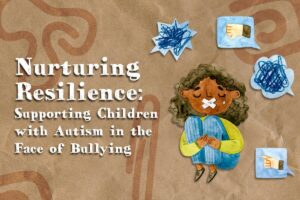
Navigating a New School Year
Returning to school for another year comes with a handful of challenges for children diagnosed with autism. Changes in routine, making new friends, paying attention in class, and doing homework are just a few. Unfortunately, another possible problem a child can face is bullying.
Dealing with bullying can be an overwhelming challenge for any child, but when your child has autism, it requires special attention and support. As a parent, it’s crucial to empower your child, foster open communication, and collaborate with schools to create a safe and inclusive environment.
Let’s explore effective strategies to help you navigate the complexities of bullying and provide your child with the tools to overcome bullies, build strong self-esteem, and empower them to thrive.
1. Creating Open Communication
Encourage your child to express their emotions and share their experiences without judgment with you. Establishing a safe space where they feel heard and supported is key. Actively listen to their concerns, validate their feelings, and assure them that they are not at fault.
Model this behavior and show them the value of confiding with someone you love and trust. Using visual supports, such as emotion charts or social stories, can help your child communicate and understand their feelings.
By maintaining open lines of communication, you can build trust and strengthen your bond with your child forming a lifelong friendship and deeper connection.
Just remember to be patient and allow your child to express themselves at their own pace. Respect their boundaries and provide reassurance that you’re there to support them unconditionally.
2. Empowering Your Child
Education is a powerful tool in empowering your child with autism. Teach them about their diagnosis, how to express their unique strengths, and celebrate their accomplishments. You can also point out what they do well or focus on topics they are knowledgeable about.
This can be as simple as praising them for completing a task or recognizing their special interests and talents. By focusing on their positive qualities, you can help them see themselves in a more positive light. The key is to be enthusiastic and encouraging!
Help them understand that being different is something to embrace and to be proud of their individuality. Building their self-confidence and self-advocacy skills is essential.
3. Building Social Skills
Developing strong social skills is crucial for your child’s overall well-being. Here are a few easy ideas to help promote social skills in children with autism:
-
Participating in group activities such as group therapy, social clubs, or organized sports where they can engage with peers who share similar interests.
-
Practicing role-playing and social scenarios at home to help your child develop essential social skills, such as initiating conversations, maintaining eye contact, and taking turns during interactions.
-
Setting achievable goals for social skill development, which can help them break down larger skills into smaller, manageable steps.
-
Fostering empathy and understanding by encouraging your child to consider others’ perspectives and emotions. Teach them the importance of listening, taking turns, and respecting personal boundaries.
These opportunities not only enhance their social skills but also provide a supportive environment where they can form meaningful connections and friendships.
4. Building a Support Network
Connect with local support groups or online communities where you can find other parents facing similar challenges. Sharing experiences, strategies, and resources can provide your child with emotional support and practical advice.
You should also communicate with the school’s teachers, counselors, or administrators to ensure they are aware of the situation and collaborate on a way to alleviate it.
Surrounding yourself and your child with a supportive network can make a significant difference in navigating the bullying journey. We can create a supportive environment that fosters inclusivity and understanding for all children and eliminate bullying.
Conclusión
Dealing with bullying requires a multi-faceted approach. By fostering open communication, empowering your child, building social skills, and seeking support, you can help your child with autism face bullying with resilience. Remember, every child deserves respect, acceptance, and the opportunity to thrive. Together, let’s create a world where all children can grow and flourish.







